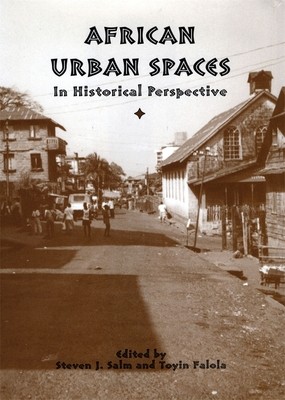
- We will send in 10–14 business days.
- Publisher: University of Rochester Press
- ISBN-10: 1580463142
- ISBN-13: 9781580463140
- Format: 15.2 x 22.9 x 2.3 cm, softcover
- Language: English
- SAVE -10% with code: EXTRA
African Urban Spaces in Historical Perspective (e-book) (used book) | bookbook.eu
Reviews
Description
This book presents new and interdisciplinary approaches to the study of African urban history and culture. Moving between precolonial, colonial, and contemporary urban spaces, it covers the major regions, religions, and urban societies of sub-Saharan Africa.
African Urban Spaces in Historical Perspective presents new and interdisciplinary approaches to the study of African urban history and culture. It presents original research and integrates historical methodologies with those of anthropology, geography, literature, art, and architecture. Moving between precolonial, colonial, and contemporary urban spaces, it covers the major regions, religions, and cultural influences of sub-Saharan Africa. The themes include Islam and Christianity, architecture, migration, globalization, social and physical decay, identity, race relations, politics, and development. This book elaborates on not only what makes the study of African urban spaces unique within urban historiography, it also offers an-encompassing and up-to-date study of the subject and inserts Africa into the growing debate on urban history and culture throughout the world.The opportunities provided by the urban milieu are endless and each study opens new potential avenues of research. This book explores some of those avenues and lays the groundwork on which new studies can build. Contributors: Maurice NyamangaAmutabi, Catherine Coquery Vidrovitch, Mark Dike DeLancey, Thomas Ngomba Ekali, Omar A. Eno, Doug T. Feremenga, Laurent Fourchard, James Genova, Fatima Muller-Friedman, Godwin R. Murunga, Kefa M. Otiso, Michael Ralph, Jeremy Rich, Eric Ross, Corinne Sandwith, Wessel Visser. Toyin Falola is the Jacob and Frances Sanger Mossiker Chair in the Humanities and University Distinguished Teaching Professor at the University of Texas at Austin; Steven J.Salm is Assistant Professor of History, Xavier University of Louisiana.
EXTRA 10 % discount with code: EXTRA
The promotion ends in 20d.15:59:42
The discount code is valid when purchasing from 10 €. Discounts do not stack.
- Publisher: University of Rochester Press
- ISBN-10: 1580463142
- ISBN-13: 9781580463140
- Format: 15.2 x 22.9 x 2.3 cm, softcover
- Language: English English
This book presents new and interdisciplinary approaches to the study of African urban history and culture. Moving between precolonial, colonial, and contemporary urban spaces, it covers the major regions, religions, and urban societies of sub-Saharan Africa.
African Urban Spaces in Historical Perspective presents new and interdisciplinary approaches to the study of African urban history and culture. It presents original research and integrates historical methodologies with those of anthropology, geography, literature, art, and architecture. Moving between precolonial, colonial, and contemporary urban spaces, it covers the major regions, religions, and cultural influences of sub-Saharan Africa. The themes include Islam and Christianity, architecture, migration, globalization, social and physical decay, identity, race relations, politics, and development. This book elaborates on not only what makes the study of African urban spaces unique within urban historiography, it also offers an-encompassing and up-to-date study of the subject and inserts Africa into the growing debate on urban history and culture throughout the world.The opportunities provided by the urban milieu are endless and each study opens new potential avenues of research. This book explores some of those avenues and lays the groundwork on which new studies can build. Contributors: Maurice NyamangaAmutabi, Catherine Coquery Vidrovitch, Mark Dike DeLancey, Thomas Ngomba Ekali, Omar A. Eno, Doug T. Feremenga, Laurent Fourchard, James Genova, Fatima Muller-Friedman, Godwin R. Murunga, Kefa M. Otiso, Michael Ralph, Jeremy Rich, Eric Ross, Corinne Sandwith, Wessel Visser. Toyin Falola is the Jacob and Frances Sanger Mossiker Chair in the Humanities and University Distinguished Teaching Professor at the University of Texas at Austin; Steven J.Salm is Assistant Professor of History, Xavier University of Louisiana.


Reviews